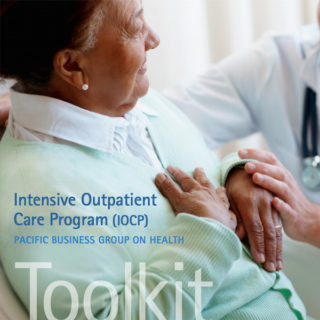Intensive Outpatient Care Program (2012-2015)
The Intensive Outpatient Care Program (IOCP) was a three-year initiative led by the California Quality Collaborative from 2012 to 2015 through a CMS Innovation Center grant. The program supported 23 participating provider organizations serving over 15,000 Medicare beneficiaries across Arizona, California, Idaho, Nevada, and Washington in adopting a patient-centered, team-based care model to manage high-risk, medically complex patients. IOCP focused on improving clinical outcomes, enhancing patient experience, and reducing the utilization of high-cost care services such as emergency department visits and hospitalizations. The program enrolled over 9,500 patients, particularly targeting those whose outcomes could be significantly improved through enhanced care coordination.
Program Overview
IOCP provided a comprehensive framework for integrating intensive outpatient care into participating healthcare organizations’ existing services. Key elements of the program included:
- Multidisciplinary Team-Based Approach. Central to the IOCP model was a care coordinator who served as the primary link between patients and their care teams, including primary care, specialty services and community resources.
- Comprehensive Care Coordination. The program emphasized coordination of medical, behavioral and psychosocial care tailored to the needs of patients with chronic illnesses and multiple comorbidities.
- Patient-Centered Care Planning. Care coordinators worked with patients to develop individualized care plans that aligned with their personal health goals and needs.
- Support for Self-Management. Patients were provided with tools and resources to manage their conditions effectively, reducing dependency on emergency and inpatient services.
Participant Support
IOCP participants received:
- Funding and Grants. Financial support to implement and sustain the intensive outpatient care model.
- Training and Curriculum. Access to a comprehensive training curriculum focusing on patient-centered care, care coordination and self-management strategies.
- Peer Learning Opportunities. Regular learning sessions and workshops to share insights, strategies and best practices among peers.
- Technical Assistance. Ongoing support from CQC and its partners, including expertise in care model design, data analytics and quality improvement.
Program Outcomes
IOCP achieved significant improvements in both patient outcomes and health care utilization:
- Reduction in Depression Symptoms. The program reported a 33% improvement in average PHQ-9 scores among participants, indicating better management of depression.
- Reduction in Cost of Care. 21% reduction in cost of care for high-risk patients enrolled for at least nine months.
- Increased Patient Activation. 3.6% patient engagement increase of patients advancing to a higher level of activation.
- Health Status Improvement. Participants showed a 3.4% increase in mental health composite scores and a 4.1% increase in physical health composite scores, according to the Health Status Survey (VR-12) results.
Funding
IOCP was made possible by the generous support of the Centers for Medicare & Medicaid Services.
Resources

Intensive Outpatient Care Program (IOCP) Toolkit
The resources assembled here are meant to equip the managers and the staff of primary care programs that have been created specifically to serve adults aged 65 and over with the greatest health care needs.